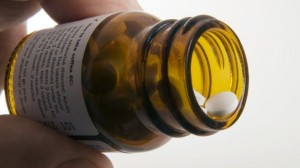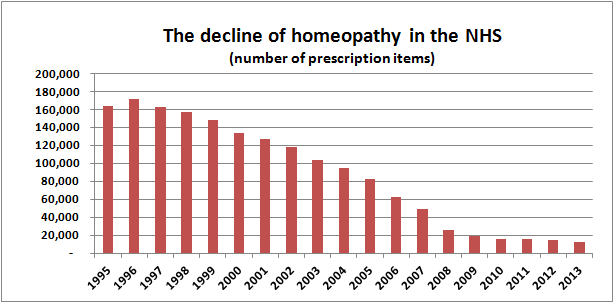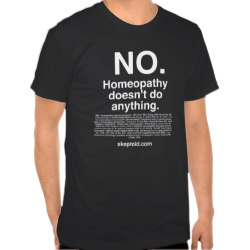Jul
08
2016
 Yes. Yes we should.
Yes. Yes we should.
This is an interesting idea I had not previously considered. Danny Chambers is a UK veterinarian from Devon who started a Change.org petition to ban the veterinary use of homeopathy in the UK. He has 1,000 signatures from UK vets so far (out of the 22,000 total UK vets).
Chambers said:
“We think vets these days should be offering 21st Century medicine,” he told BBC News.
“It’s been shown that homeopathy doesn’t work, so it probably shouldn’t be offered any more even if it is offered with good intentions.”
It is absolutely clear that homeopathy is worthless. This is among the most solid conclusions in all of medical science. First, there is no possible way according to our current understanding of physics, chemistry, and physiology that homeopathic potions can have any biological effect. It’s not just unknown – we have very good reasons to conclude that homeopathy cannot work (follow the link above for more details if you are unfamiliar with these reasons).
Continue Reading »
Feb
22
2016
 In a recent blog post for the BMJ, Paul Glasziou wrote about the recent Australian review of homeopathic remedies of which he was head:
In a recent blog post for the BMJ, Paul Glasziou wrote about the recent Australian review of homeopathic remedies of which he was head:
…I lost interest after looking at the 57 systematic reviews (on 68 conditions) which contained 176 individual studies and finding no discernible convincing effects beyond placebo.
He is not the first person to look at the totality of clinical evidence for homeopathy and find it wanting. Glasziou was chair of the working party that produced the 2015 NHMRC report on homeopathy, which concluded:
Based on the assessment of the evidence of effectiveness of homeopathy, NHMRC concludes that there are no health conditions for which there is reliable evidence that homeopathy is effective.
So, after more than two centuries, and thousands of studies in total, no homeopathic treatment has crossed over the line of what would generally be considered sufficient evidence to prove that it works. That is very telling. I liken the evidence to other dubious claims, such as ESP. After a century of research and thousands of studies there is no clear evidence that ESP is real.
For both homeopathy and ESP there is a great deal of noise, but no clear signal. There are many flawed or small studies, but no repeatable high quality studies. Continue Reading »
Nov
13
2015
 The British National Health Service (NHS) is considering blacklisting homeopathy prescriptions from general practitioners. While this would have an overall small effect on the homeopathy market, it is politically potentially very significant.
The British National Health Service (NHS) is considering blacklisting homeopathy prescriptions from general practitioners. While this would have an overall small effect on the homeopathy market, it is politically potentially very significant.
The NHS currently spends about £4m on homeopathy each year, of which only £110,000 is from GP prescriptions. The rest is from homeopathic hospitals (yes, hospitals). The real market, however, is in over the counter homeopathic products.
In the UK, Europe and the US homeopathy has ballooned into a multi-billion dollar industry. It is now potentially, it seems, the victim of its own success. When it was smaller it essentially flew under the radar – regulators and politicians didn’t think it was worth spending political capital to reign in a fringe treatment that people either wanted or did not know or care about.
In the US the FDA specifically decided to let the homeopathic industry regulate itself, because it was simply too small for them to spend their resources on. That has now changed.
Continue Reading »
Sep
18
2015
 The American Association of Naturopathic Physicians is lobbying Congress to pay naturopaths to treat vetarans, specifically for chronic pain. This, of course, goes beyond “health care freedom” (which itself is dubious) and is asking for taxpayer dollars to be spent on unproven and pseudoscientific treatments.
The American Association of Naturopathic Physicians is lobbying Congress to pay naturopaths to treat vetarans, specifically for chronic pain. This, of course, goes beyond “health care freedom” (which itself is dubious) and is asking for taxpayer dollars to be spent on unproven and pseudoscientific treatments.
The open letter does not mention specific treatments that naturopaths would offer. Instead it fearmongers about pharmacological treatments for pain. It is certainly true that opiates are a double-edged sword. They are powerful pain killers, but long term use causes dependence, tolerance, and may complicate pain management. Science-based physicians are well aware of this, and use a variety of approaches to minimize opiate use for chronic pain.
The letter claims that naturopaths have unique “natural” therapies that can effectively treat pain. This is one of the core myths of “alternative” medicine – if there were a treatment that objectively worked, it would be incorporated into mainstream medicine.
Continue Reading »
Aug
27
2015
 The FDA (Food and Drug Administration) recently asked for public comment on its regulatory policies regarding homeopathy. They probably didn’t figure that a fellow federal agency, the FTC (Federal Trade Commission) would respond.
The FDA (Food and Drug Administration) recently asked for public comment on its regulatory policies regarding homeopathy. They probably didn’t figure that a fellow federal agency, the FTC (Federal Trade Commission) would respond.
The FTC also recently asked for public comment on how it can better regulate homeopathic product advertising. While the FDA regulates food and drugs (including supplements), the FTC regulates claims that sellers can make about those foods and drugs. The FTC is now complaining to the FDA that their policies are in inherent conflict. They write:
The staff comment notes that the FDA’s regulatory framework for homeopathic drugs, set forth in a 1988 Compliance Policy Guide, does not require that over-the-counter (OTC) homeopathic drugs be approved by FDA as safe and effective if they satisfy certain conditions, including that the product’s label contains an indication for use. Yet the policy guide does not require sellers to have competent and reliable scientific evidence to support the indication for use.
The comment states that given the FTC’s long-standing advertising substantiation policy that health claims must be substantiated by such evidence the FDA’s current regulatory framework may harm consumers and confuse advertisers.
Continue Reading »
Jun
19
2015

Several years ago, during a lecture on Science-Based Medicine, I noted that if there were one medical pseudoscience that was vulnerable to extinction it was homeopathy. Homeopathy is perhaps the most obviously absurd medical pseudoscience. It is also widely studied, and has been clearly shown to not work. Further, there is a huge gap in the public understanding of what homeopathy is; it therefore seems plausible that the popularity of homeopathy can take a huge hit just by telling the public what it actually is.
Further, homeopathy is in a precarious regulatory position. Homeopathic products are presented and regulated as drugs, but clearly they are not, and they are also not supplements, herbal drugs, nutrition-based, or natural products. They are simply fraudulent drugs riding a wave of ignorance.
In the last few years homeopathy has had a rough time. While the industry is still growing, there are signs of clear trouble on the horizon. Let’s review:
Some Background
Homeopathy is a 200 year old pre-scientific system of medicine based upon magical thinking. It is mostly based on two notions, the first of which is that like cures like. In other words, a substance that causes a symptom can cure that symptom in extremely low doses. There is no scientific basis for this, despite the desperate attempts by homeopaths to invoke vaccine-like analogies, or their new favorite, hormesis.
Continue Reading »
May
04
2015
Every now and then we get a public peek into the mind of a crank or pseudoscientist. This is not to say that they don’t utter complete nonsense often, but usually in public they try to put a sanitized and rational face on their quackery. An unfiltered rant can be refreshing and illuminating.
Recently a homeopath, Mary English, wrote such a public rant against Simon Singh, who is a science communicator and promoter of rationality. What has English so riled is the fact that Singh is threatening to sue the National Health Service (NHS) for wasting taxpayer money by funding homeopathy.
Singh is an open critic of so-called alternative medicine. He has written about homeopathy before, explaining why it is complete unscientific lunacy. He famously was sued by the British Chiropractic Association for daring to say that they embrace “bogus” therapies (because they do). He works for a charity, the Good Thinking Society, which has challenged the UK powers-that-be to reconsider their support of homeopathy:
In February 2015, The Good Thinking Society, working with Bindmans LLP, wrote to Liverpool CCG (Clinical Commissioning Group) in order to highlight and challenge the CCG’s decision to approve spending on homeopathic treatments – a decision we believe to be unlawful, and contrary to the best interest of local patients. In April 2015, Liverpool CCG conceded our challenge and agreed to make a fresh decision on the issue.
Continue Reading »
Apr
14
2015
The skeptical community is abuzz with the announcement by the FDA’s announcement that they are reviewing the “regulatory framework” of homeopathic products and are open to public input. We have written about this at Science-Based Medicine, and as you can imagine, this is a serious topic of discussion among the editors.
Background
The FDA regulates food, drugs, medical devices, supplements, and cosmetics for the purpose of protecting the public health and safety. Congress created the FDA and determines its powers. In the 1938 FDA act, one Senator, Royal Copeland, who was a physician and homeopath, included in the bill that the provision that the Homeopathic Pharmacopeia of the United States (HPUS) would be included in the list of official drugs.
What this means exactly is that homeopathic products are automatically considered drugs by the FDA. Further, any new homeopathic product added to the HPUS in a supplement also counts. All homeopaths have to do, therefore, to get a homeopathic product listed as a drug by the FDA is write it down in one of their supplements to the HPUS. That’s it. No research is necessary, no assurance of safety or efficacy.
Continue Reading »
Mar
19
2015
I was recently pointed to an excellent article by an Irish journalist, Jonathan McCrea, about homeopathy. He discussed the topic on his radio show, and was highly critical of the practice. In response a homeopath wrote in a letter complaining that the shows was too negative, and McCrea wrote a nice reply pointing out the scientific evidence. He quoted science-based medicine extensively, as well as systematic reviews.
It’s wonderful to see a science journalist who is not a scientist themselves do such a great job. As he explained himself in the reply, a good journalist will reflect the consensus of expert opinion. He also pointed out the dangers in medical nonsense and clearly understands his duty as a journalist when reporting on such issues – so good for him.
Here is the money quote from the homeopath:
What I would like to point out to your presenters is that never, in all their dismissal of homeopathy, do they seem to take into consideration the homeopaths who practice this particular brand of ‘heresy’ (heresy according to their own particular view of the world that is). If it is nonsense as they claim, then we are all either stupid, deluded or charlatans who take people’s money for something which we know does nothing. I may be many things but I am neither stupid, deluded nor a charlatan as anyone who knows me will verify. Neither are those thousands of doctors and vets who have changed from using conventional medicine to homeopathy. No homeopath or user of homeopathy comes to it from ‘belief’. We come to it from trying it, sometimes from curiosity, but often in desperation when other things haven’t worked. Then when we see it works we try it again. Then it works again and we try it more often, and it keeps working. Not every time, any more than antibiotics, or any other medicine works every time. But enough, more than enough to make us trust it.
This is a typical response – the appeal to anecdotal evidence. Clearly this homeopath does not understand the scientific position. She sets up an interesting forced choice straw man, that critics think homeopaths are either stupid, deluded, or charlatans. First, these are not mutually exclusive states. But then she equates these possibilities to using treatments which “we know does nothing.” That is a non-sequitur, however. If a homeopath is stupid or deluded then they don’t know that what they are using does nothing.
Continue Reading »
Jan
01
2015
 I have been saying for several years that if there is a pseudoscientific medical treatment that is especially vulnerable to critical analysis it’s homeopathy. There’s a lot of nonsense in the world of medicine, but homeopathy takes the prize. First, it is complete and utter nonsense.
I have been saying for several years that if there is a pseudoscientific medical treatment that is especially vulnerable to critical analysis it’s homeopathy. There’s a lot of nonsense in the world of medicine, but homeopathy takes the prize. First, it is complete and utter nonsense.
There is no need to equivocate. Homeopathy violates basic scientific knowledge in physics, chemistry and biology. It is transparent witchcraft that cannot possibly work by any known or even semi-plausible mechanism. Further, clinical studies unsurprisingly show that it does not work, for anything.
And yet the public does not generally understand what homeopathy actually is. The most common belief is that homeopathy is natural or herbal medicine. Rather, homeopathy is based upon several dubious notions. The first is that like cures like, and idea based on sympathetic magic and not science or any knowledge of the real world. Further, the actual starting ingredients are based upon a fanciful and often absurd interpretation of this dubious notion, leading to things like using duck liver to treat the flu.
None of this actually matters, however, because most homeopathic remedies are diluted beyond the point that there is any chance of a single molecule of starting ingredient remaining. All of this is supposed to work, however, because the potion is “activated” by shaking it.
Continue Reading »
 Yes. Yes we should.
Yes. Yes we should.
 In a r
In a r









